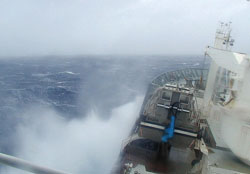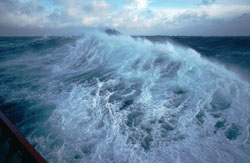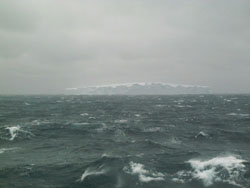Press Information
Climate change affects Southern Ocean carbon sink
The first evidence that recent climate change has weakened one of the Earth’s natural carbon ‘sinks’ was published recently in the journal Science.
A four-year study by scientists from the University of East Anglia (UEA), British Antarctic Survey (BAS) and the Max-Planck Institute for Biogeochemistry reveals that an increase in winds over the Southern Ocean, caused by greenhouse gases and ozone depletion, has led to a release of stored CO2 into the atmosphere and is preventing further absorption of the greenhouse gas.
Corinne Le Quéré, Christian Rödenbeck, Erik T. Buitenhuis, Thomas J. Conway, Ray Langenfelds, Antony Gomez, Casper Labuschagne, Michel Ramonet, Takakiyo Nakazawa, Nicolas Metzl, Nathan Gillett, Martin Heimann(2007) Saturation of the Southern Ocean CO2 Sink Due to Recent Climate Change Science 22 June 2007: Vol. 316. no. 5832, pp. 1735 – 1738 DOI: 10.1126/science.1136188
Full Article: link to authors home page (pdf, 2.91 Mb)
Press Releases
Images free to use with credit |
|
|---|---|
|
 Oceanic and atmospheric measurements of CO2 in the Indian sector of the Southern Ocean. are taken nboard the R.S.S. Marion-Dufresnes (IPEV, France). During the Southern Ocean winter, winds are stronger than anywhere else in the world. (Image free to use with credit: N.Metzl, August 2000, oceanographic cruise OISO-5). (JPG 101kb) or (JPG 30kb) |
 Southern Ocean waves. (Image free to use with credit: BAS) (JPG 821kb) or (JPG 38kb) |
|

